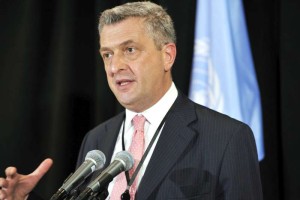Filippo Grandi – man on a mission
A man with one of the toughest jobs in the world is Filippo Grandi, who arrived in Geneva this week to begin his five-year term as head of the UN’s refugee agency.
He is replacing the revered António Guterres – who held the office of High Commissioner for the past 10 years – a tough gig in itself.

Filippo Grandi has his work cut out for him as the head of the UN’s refugee agency
But he is also taking over the reins at a time when record numbers of people around the world are fleeing persecution and conflict and in need of UNHCR’s protection and support.
Unlike many of his predecessors he is not a career politician. He has had a long and distinguished career with the UN, including a stint as head of UNRWA, the agency for Palestinian refugees.
His experience in the humanitarian and refugee sectors have made him popular in the sector for the role of High Commissioner, but he has his work cut out for him in becoming UNHCR’s chief fundraiser and refugee advocate at possibly the most crucial and challenging time in the agency’s history.
He faces the considerable challenge of overseeing the effort to provide protection and support to more than 60 million forcibly displaced people.
Latest UN figures show 2015 was another record-breaking year for forced displacement, with five million people newly displaced between January and June alone. The number of refugees, asylum seekers, and stateless and internally displaced people who fall under UNHCR’s mandate has exceeded 60 million. Of those, just over 20 million are refugees, the highest number since 1992.
Grandi also needs to tackle protracted displacement. The rate at which refugees are able to safely return home is at its lowest level in more than three decades.
Speaking at his final press conference last month, Guterres recalled that when he first took office a decade ago, UNHCR helped one million people return home. In 2014, only 124,000 people were able to do so.
As conflicts and displacement become increasingly protracted, Grandi and his staff are faced with the task of continuing to support refugee populations beyond the emergency phase. To a large extent, this will mean helping refugees find ways to sustain themselves.
To add to all of this, the UNHCR is facing tougher budget constraints. One of Grandi’s main tasks will be to persuade donors to fund the soaring cost of supporting the growing numbers of refugees.
UNHCR’s programmes are almost entirely dependent on voluntary contributions from governments and private donors. Over the past five years, the agency’s budget has more than doubled, peaking at $7.2 billion in 2015. Donor contributions have not kept pace, meaning that 53 per cent of the 2015 budget had not been funded by the end of the year. With a proposed budget of $6.5 billion for 2016, Grandi urgently needs to find new, creative ways to address the growing funding gap as health, education, livelihoods support, and even basic assistance programmes face cuts.
He is going to have to look at broadening the agency’s current reliance on a handful of governments for the majority of contributions.
Grandi is taking the helm at UNHCR at a time when attitudes towards refugees have never been so polarised or politicised and among escalating security concerns; real and perceived.
Partly, this is the result of one million asylum seekers arriving in Europe in 2015, stoking fears among local populations that job markets and public services would be swamped.
But those fears have been compounded by security concerns, particularly in the wake of the November terror attacks in Paris and news that at least one of the attackers entered Europe via Greece by posing as a Syrian refugee. A number of member states, including France, Germany, Sweden and Denmark, have since imposed border controls that make it more difficult for asylum seekers to move through Europe.
Grandi will need to champion a response that preserves asylum seekers’ right to international protection in the context of increased security checks and border controls.
Perhaps the greatest challenge facing the new High Commissioner is how to address the fundamental causes of displacement.
The only way the current trend of ever-growing levels of global displacement can be reversed is to tackle the major drivers, the biggest of which is conflict.
Before his appointment as the new High Commissioner, Grandi set out his approach to the role saying that while “UNHCR is not a political or development actor” it “must step up its advocacy with those who are – world leaders, other organisations and civil society – and call for urgent action”, and that in doing so “it must become more sharp and convincing”.
Laurie Nowell
AMES Australia Senior Journalist












